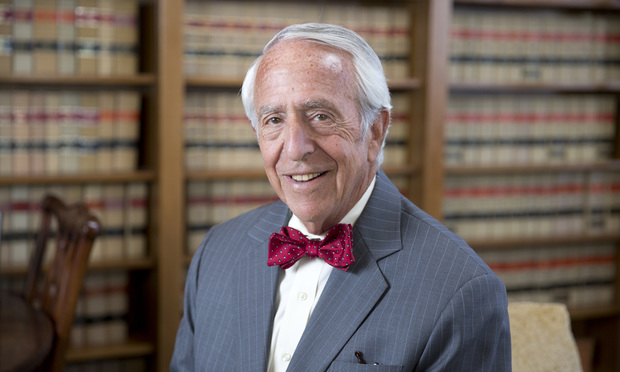Daily Dicta: Judge Blasts SEC as a 'Carrion Hawk' for Tardy Suit Against VW
" I am totally mystified as to why you waited three years," U.S. District Judge Charles Breyer said to a lawyer for the SEC in court on Friday.
May 13, 2019 at 11:31 AM
6 minute read
 U.S. District Judge Charles Breyer, Northern District of California
U.S. District Judge Charles Breyer, Northern District of California
Forget the old saying. Sometimes late is not better than never.
Or so suggested U.S. District Judge Charles Breyer in San Francisco, who compared the Securities and Exchange Commission to a “carrion hawk” at a status conference on Friday.
Breyer had issues—big issues—with a suit that the agency filed two months ago against Volkswagen in connection with the diesel emissions cheating scandal. Yes, that scandal. The one VW in 2016 wrapped up with the rest of the federal government, the AGs from 44 states and just about every plaintiff's lawyer with a pulse in a giant, $14.7 billion bow.
“My basic question is what took you so long,” Breyer said to SEC lawyer Daniel Hayes, according to a transcript of the proceedings.
“I want to remind you that the symbol of the SEC is the symbol right up there, of the eagle,” Breyer said—not a vulture “that simply descends when everything is all over and sees what it can get from the defendant.”
Ouch.
It's not what you'd call an auspicious start for the SEC, which through a spokeswoman declined to comment on the proceedings.
I wrote a skeptical column about the case shortly after it was filed, and Breyer seems to share some of my misgivings.
The agency alleges that VW (which is primarily listed on the Frankfurt Stock Exchange) sold “billions of dollars of corporate bonds and other securities in the United States … without disclosing that its 'clean diesel' cars used defeat devices to conceal substantial emissions problems.”
 Widows and orphans this case is not. The bonds were private placements that were open only to investors with a minimum of $100 million. According to the SEC, Volkswagen defrauded these institutional investors out of hundreds of millions of dollars of additional profits because they should have been paid a higher interest rate on their money.
Widows and orphans this case is not. The bonds were private placements that were open only to investors with a minimum of $100 million. According to the SEC, Volkswagen defrauded these institutional investors out of hundreds of millions of dollars of additional profits because they should have been paid a higher interest rate on their money.
VW, which is represented by Sullivan & Cromwell's Robert Giuffra Jr., denounced the suit as “piling on” and stressed that no investors lost any money, receiving all payments of interest and principal in full and on time.
But Breyer on Friday wasn't interested in the substance of the dispute.
Since late 2015, he's presided over the diesel emissions MDL. In court on Friday, he reminded the SEC's Hayes of how the litigation unfolded.
“In 2016, in January,” he said, “in response to the creation of the multidistrict litigation, the Department of Justice, you are familiar with them, filed a complaint.”
Oh burn. “You are familiar with them?”
Breyer continued, “February 22, the plaintiff steering committee as it was constituted by this court, filed either a first amended complaint or a consolidated complaint …. [O]n March 29th of 2016, the Federal Trade Commission filed its complaint.”
“In May 2016, the ADR shareholders filed a complaint. In June, California filed its complaint,” the judge continued. “And in December the bondholders filed their complaint. All of which is three years ago.”
Breyer then continued to tick off milestone after milestone in the litigation.
“That takes us through 2018, not a word did we hear from the Securities and Exchange Commission of the United States. Until March 14, 2019 when the SEC filed its complaint,” he said.
“So, I want to find out from you, why you would wait three years after all of this litigation, all of these settlements, all of these efforts, enormous devotion of judicial and party resources, including the government of the United States, through the Department of Justice and through the Federal Trade Commission and the state agencies, and EPA, and the state agencies, through CARB, and the attorneys general of the states of the United States. All of those efforts, and nary a word from the SEC,” Breyer said.
“So I am totally mystified as to why you waited three years,” he said to Hayes (whom I'm starting to feel sorry for).
Hayes responded, “We moved as quickly as we could. … We conducted an investigation that specifically focused on whether there were violations of the securities laws. That takes time.”
Breyer was unimpressed.
“So I have before me your complaint which is 69 pages, in which there are roughly 282 paragraphs,” he said. “And so, I am ordering the SEC to go through their complaint, paragraph by paragraph, and set forth, by way of declaration, when they discovered each of the factual allegations that are set forth in the paragraph. You are telling me that you moved as quickly as you could, so we will see.”
Show of hands, who is glad they don't work at the SEC and now have to dig up a date behind every fact in a 69-page complaint?
A source familiar with the matter said the SEC issued its first Wells Notice to VW on June 28, 2018.
Breyer wasn't done. “Secondly, I'm directing that you set forth in a declaration your reasons for waiting until March of this year to file this complaint,” he said. “I want to be satisfied that you moved, as you say to me, as quickly as you could. And I must say, I'm somewhat skeptical because everybody else was able to move years before you moved.”
Breyer gave the SEC 60 days to submit both filings, stipulating that “the declaration of when you knew what you knew, that should be filed publicly.”
Until he's satisfied with the answers—“There may be things I'm unaware of why your agency was so encumbered that it could not move on a parallel track with all the other entities,” he said—he refused to allow the suit to go forward.
He added, “The ball is in the SEC's court to act.”
This content has been archived. It is available through our partners, LexisNexis® and Bloomberg Law.
To view this content, please continue to their sites.
Not a Lexis Subscriber?
Subscribe Now
Not a Bloomberg Law Subscriber?
Subscribe Now
NOT FOR REPRINT
© 2025 ALM Global, LLC, All Rights Reserved. Request academic re-use from www.copyright.com. All other uses, submit a request to [email protected]. For more information visit Asset & Logo Licensing.
You Might Like
View All
Shareholder Democracy? The Chatter Elon Musk’s Tesla Pay Case Is Spurring Between Lawyers and Clients
6 minute read
Litigation Leaders: Mark Jones of Nelson Mullins on Helping Clients Assemble ‘Dream Teams’

Litigators of the Week: Rolling Back Elon Musk's $56B Tesla Compensation Package

Litigators of the Week: Quinn Emanuel Slashes $137M Racial Discrimination Verdict Against Tesla by Nearly 98%
Trending Stories
- 1Whether to Choose State or Federal Court in a Case Involving a Franchise?
- 2Am Law 200 Firms Announce Wave of D.C. Hires in White-Collar, Antitrust, Litigation Practices
- 3K&L Gates Files String of Suits Against Electronics Manufacturer's Competitors, Brightness Misrepresentations
- 4'Better of the Split': District Judge Weighs Circuit Divide in Considering Who Pays Decades-Old Medical Bill
- 5Which Georgia Courts Are Closed Today?—Here's a List
Who Got The Work
J. Brugh Lower of Gibbons has entered an appearance for industrial equipment supplier Devco Corporation in a pending trademark infringement lawsuit. The suit, accusing the defendant of selling knock-off Graco products, was filed Dec. 18 in New Jersey District Court by Rivkin Radler on behalf of Graco Inc. and Graco Minnesota. The case, assigned to U.S. District Judge Zahid N. Quraishi, is 3:24-cv-11294, Graco Inc. et al v. Devco Corporation.
Who Got The Work
Rebecca Maller-Stein and Kent A. Yalowitz of Arnold & Porter Kaye Scholer have entered their appearances for Hanaco Venture Capital and its executives, Lior Prosor and David Frankel, in a pending securities lawsuit. The action, filed on Dec. 24 in New York Southern District Court by Zell, Aron & Co. on behalf of Goldeneye Advisors, accuses the defendants of negligently and fraudulently managing the plaintiff's $1 million investment. The case, assigned to U.S. District Judge Vernon S. Broderick, is 1:24-cv-09918, Goldeneye Advisors, LLC v. Hanaco Venture Capital, Ltd. et al.
Who Got The Work
Attorneys from A&O Shearman has stepped in as defense counsel for Toronto-Dominion Bank and other defendants in a pending securities class action. The suit, filed Dec. 11 in New York Southern District Court by Bleichmar Fonti & Auld, accuses the defendants of concealing the bank's 'pervasive' deficiencies in regards to its compliance with the Bank Secrecy Act and the quality of its anti-money laundering controls. The case, assigned to U.S. District Judge Arun Subramanian, is 1:24-cv-09445, Gonzalez v. The Toronto-Dominion Bank et al.
Who Got The Work
Crown Castle International, a Pennsylvania company providing shared communications infrastructure, has turned to Luke D. Wolf of Gordon Rees Scully Mansukhani to fend off a pending breach-of-contract lawsuit. The court action, filed Nov. 25 in Michigan Eastern District Court by Hooper Hathaway PC on behalf of The Town Residences LLC, accuses Crown Castle of failing to transfer approximately $30,000 in utility payments from T-Mobile in breach of a roof-top lease and assignment agreement. The case, assigned to U.S. District Judge Susan K. Declercq, is 2:24-cv-13131, The Town Residences LLC v. T-Mobile US, Inc. et al.
Who Got The Work
Wilfred P. Coronato and Daniel M. Schwartz of McCarter & English have stepped in as defense counsel to Electrolux Home Products Inc. in a pending product liability lawsuit. The court action, filed Nov. 26 in New York Eastern District Court by Poulos Lopiccolo PC and Nagel Rice LLP on behalf of David Stern, alleges that the defendant's refrigerators’ drawers and shelving repeatedly break and fall apart within months after purchase. The case, assigned to U.S. District Judge Joan M. Azrack, is 2:24-cv-08204, Stern v. Electrolux Home Products, Inc.
Featured Firms
Law Offices of Gary Martin Hays & Associates, P.C.
(470) 294-1674
Law Offices of Mark E. Salomone
(857) 444-6468
Smith & Hassler
(713) 739-1250






